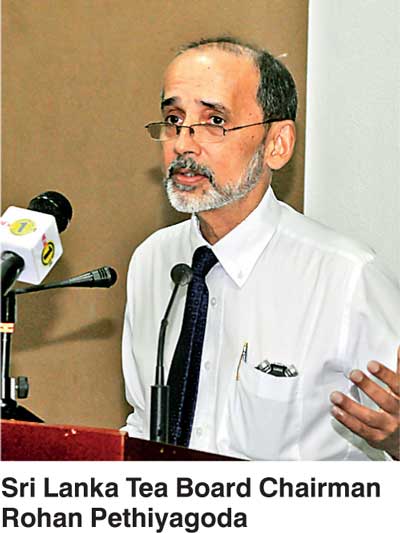Thursday Feb 19, 2026
Thursday Feb 19, 2026
Monday, 29 January 2018 00:53 - - {{hitsCtrl.values.hits}}
By Shannon Jayawardena
Identifying the low grade tea entering the market as the biggest threat currently confronting the country’s tea industry, Sri Lanka Tea Board Chairman Rohan Pethiyagoda on Friday spoke on both domestic and international supply chain challenges.

From left: Plant Quarantine Service Assistant Director J. Nimantha, Customs Exports Director Stanley Senarathna, Sri Lanka Tea Board Chairman Rohan Pethiyagoda, Sri Lanka Tea Exporters Association Director Jayantha, Sri Lanka Freight Forwarders Association Vice Chairman Roshan Silva and Shippers’ Academy Colombo CEO Rohan Masakorala - Pix by Gitika Talukdar
It is critical when shipping consumption products and agriculture exports to maintain high standards in the supply chain. However, various packages of refused tea enter the market on a daily basis, Pethiyagoda revealed. He stressed the fact that the two main problems in the tea industry were hygiene and the presence of tainted tea.
“We’ve being doing tea manufacturing for 150 years now and it so happens that we produce the world’s most expensive black tea. Our tea outsells competing origins by 50% and customers expect to see some value for the premium they pay. It is very difficult to be able to put down in a set of standards the kinds of factors you need to regulate in a beverage as sophisticated as tea,” he said.
Pethiyagoda went on to state that there were two important quality factors, one of them being hygiene, stating that tea should be reasonably free from extraneous matter. Tea from several companies in the country come in a very contaminated form at times, containing grit, stones, fragments of glass, geckos and all forms of bugs.

As a solution to the above problem, he said: “We have this system of good manufacturing priorities which has been in play for some time and we are trying to lift the standard of manufacture hygiene and everything related to tea. Conversely, the love of the art of making tea is today restricted to a minority of tea factory owners.”
If a factory is producing unclean tea then it should be shut down at once without causing degradation to the tea industry in the country, Pethiyagoda suggested. The Tea Board has already put forward a proposition of an in-depth check of certain tea companies which will be closed down at once if any unhygienic matter is found. This is to be implemented next month.
The second factor is the absence of pure tea and it is a major crisis as people are often found to be drinking tainted tea which can be very harmful to their health, at times even deadly since it could be poisonous. The Tea Board Chairman emphasised the fact that a good cup of tea was pure tea, free of colorant, sugar or milk.
“The result has been the sorry beverage that passes out as tea in our homes and elsewhere. I confess that the Tea Board itself is not a paragon of virtue in this respect as we too fail to serve you a good cup of tea on many occasions.”
However, with tea it is becoming the norm that something must be added. The whole world is now becoming more and more obsessed with flavour and fragrance. What’s the point of making this extravagantly beautiful tea in our country if we are just going to add raspberry or strawberry, the Tea Board Chairman asked. There is no incentive. While an additive to tea that is already made is okay, no additives are permitted during the tea-making process, Pethiyagoda observed.
Last year more than a dozen kilos of tea were found to contain added sugar which can be harmful as it attracts certain types of fungi during the firing process of tea. A common form of tea adulteration is bergamot which is the burnt caramel that darkens tea. Bergamot is now the origin of a very dark and dirty secret: Earl Grey Tea. “Sri Lanka was the first country to ban Glyphosate in tea which has now led to the smuggling of the chemical from elsewhere as planters are trying desperately to grow the crops. Russia recently banned all tea and agricultural exports coming from Sri Lanka due to the detection of a Capra Beetle in a shipment of tea. Hence the Government is now ready to fumigate all tea before exporting,” he said.
Pethiyagoda stressed the fact that it takes 42 hours for fumigation, which has now led to added costs and certain banking restrictions. More documents, cleaning and people are now needed for the tea industry.
The event, organised by the Shippers’ Academy Colombo, also invited several tea industry experts to share their viewpoints on these challenges as they spoke on the correct measures to be adopted. The Tea Exporters Association Chairman and officers from Quarantine Customs and the Department of Commerce were also present at the event.